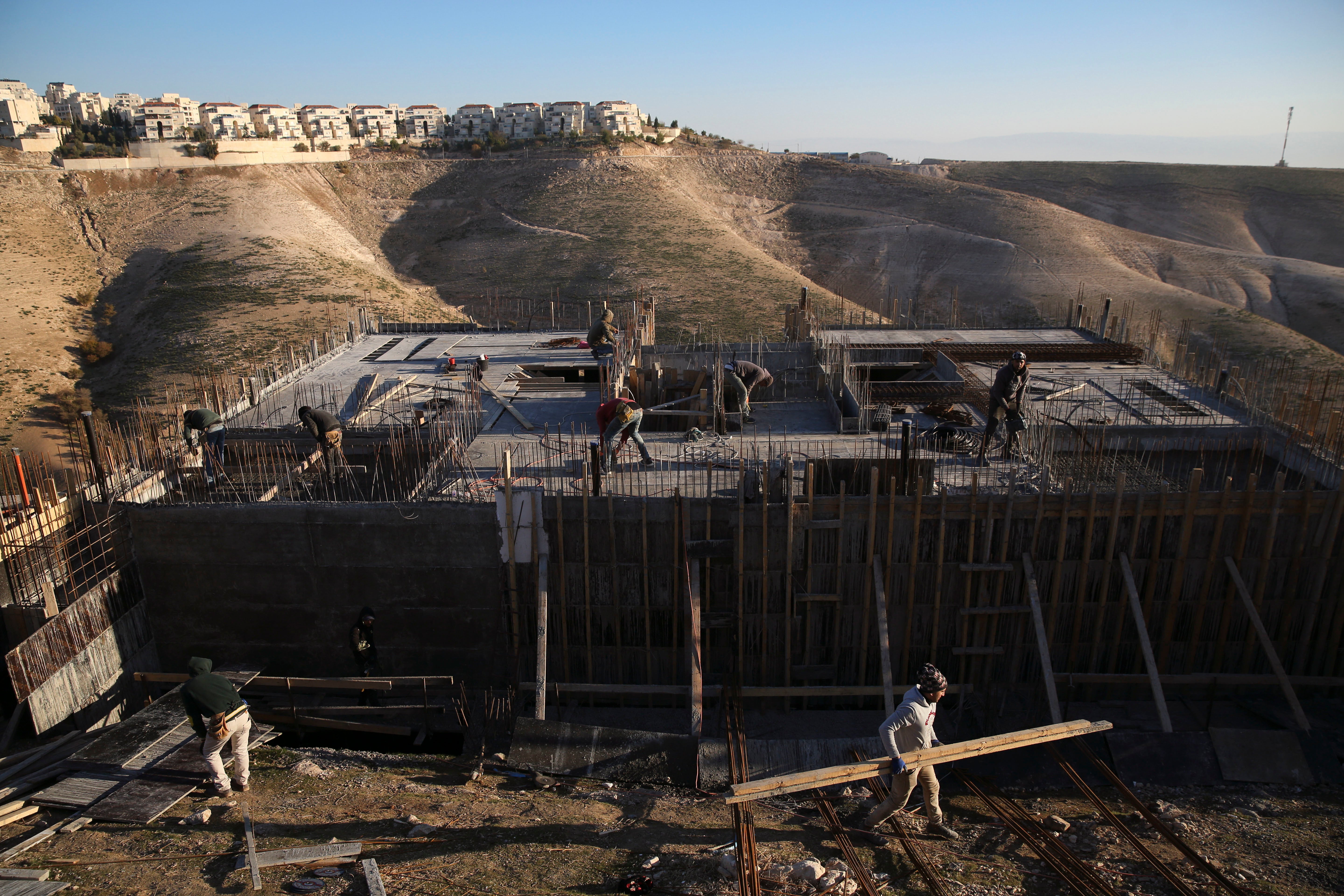Israel gives the green light to over 2,000 settlement homes
Israeli authorities have advanced plans to build over 2,100 new settlement homes in the occupied West Bank

Your support helps us to tell the story
From reproductive rights to climate change to Big Tech, The Independent is on the ground when the story is developing. Whether it's investigating the financials of Elon Musk's pro-Trump PAC or producing our latest documentary, 'The A Word', which shines a light on the American women fighting for reproductive rights, we know how important it is to parse out the facts from the messaging.
At such a critical moment in US history, we need reporters on the ground. Your donation allows us to keep sending journalists to speak to both sides of the story.
The Independent is trusted by Americans across the entire political spectrum. And unlike many other quality news outlets, we choose not to lock Americans out of our reporting and analysis with paywalls. We believe quality journalism should be available to everyone, paid for by those who can afford it.
Your support makes all the difference.Israeli authorities on Wednesday advanced plans to build over 2,100 new settlement homes in the occupied West Bank pressing ahead with a building boom that has gained steam during the presidency of Donald Trump
The approval raised the number of settlement homes to be advanced this year to nearly 9,500, according to a settlement watchdog group, by far the highest number of approvals since Trump took office in early 2017. The Civil Administration’s higher planning council, the defense body that grants the approvals, is set to meet again on Thursday, meaning that figure could go even higher.
A string of U.S. administrations along with the rest of the international community, opposed Israeli settlement construction.
But Trump, surrounded by a team of advisers with close ties to the settler movement, has taken a different approach. In contrast to its predecessors, the Trump administration has not criticized or condemned new settlement announcements, and in a landmark decision last year, Secretary of State Mike Pompeo said the U.S. does not consider settlements to be illegal under international law.
The Trump administration's Mideast plan, unveiled early this year, calls for leaving 30% of the West Bank, including all of Israel’s more than 120 settlements, under permanent Israeli control.
The Palestinians claim all of the West Bank, captured by Israel in the 1967 Mideast war, as part of a future independent state. They say the growing settler population, approaching 500,000 in the West Bank, has made it increasingly difficult to achieve their dream of independence.
Nabil Abu Rdeneh, spokesman for Palestinian President Mahmoud Abbas, condemned Wednesday’s announcement, saying the Trump administration’s policies, along with moves by two Gulf Arab states — the United Arab Emirates and Bahrain — to establish formal ties with Israel, have made that goal impossible.
“The Netanyahu government is determined to go ahead with its settlement policies to steal Palestinian land, taking advantage of international silence, free normalization, and blind support by the Trump administration for the occupation and its settlement policies,” he said.
Israel said that some 1,313 housing units have been given final bureaucratic approval for construction to begin, while 853 homes received preliminary approvals that will still require additional review. The approvals add to a growing pipeline of construction that is expected to take off in the next few years. One of those plans would build 560 homes in Har Gilo, a strategically placed settlement that between the Palestinian city of Bethlehem and Jerusalem.
Peace Now, an anti-settlement watchdog group, said that several hundred units had been previously announced by Israel. But altogether, Israel has now advanced 9,459 settler homes this year, the highest level since Trump took office. That number is expected to rise further after Thursday’s meeting, when as many as 2,500 homes are expected to be approved.
Under its landmark deal establishing ties with the UAE, Israel agreed to freeze a plan to annex parts of the West Bank it would keep under the Trump plan. The UAE has said it made this demand to keep Palestinian hopes alive.
“This is de facto annexation,” said Brian Reeves, a spokesman for Peace Now. “We will continue to feel the effects of this when construction begins," he said, regardless of who wins next month's presidential election.
Settler leaders, a key constituency of Prime Minister Benjamin Netanyahu, welcomed the announcement.
Shlomo Neeman, head of the Gush Etzion regional council, said settlers had been disappointed by Netanyahu’s decision to abandon his annexation plan. “But now something tangible is happening. We are building and developing our communities,” he said.
The neighboring country of Jordan, which borders the West Bank and controlled the area before it was captured by Israel, condemned the Israeli step.
Dhaifallah Ali al-Fayez, spokesman for the Jordanian Foreign Ministry, called the construction illegal and said it undermines the chances of a two-state solution between Israel and the Palestinians.